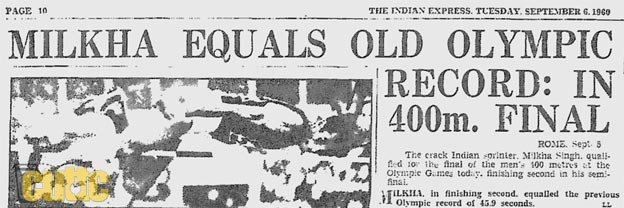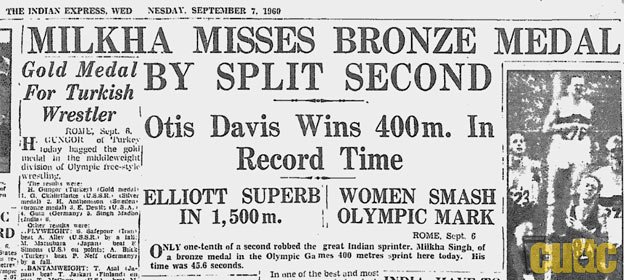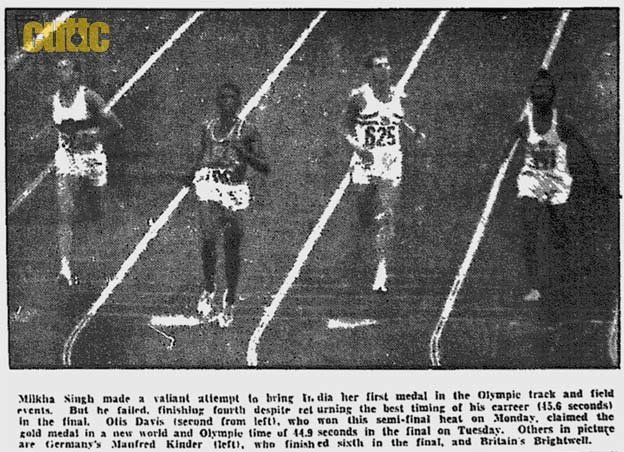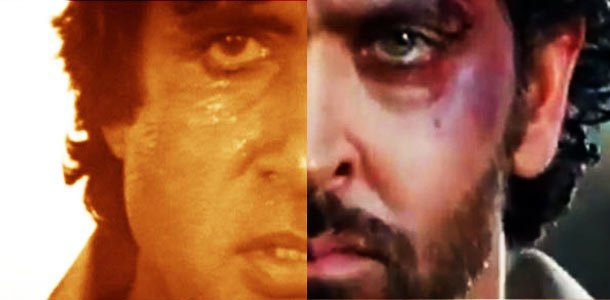Indians would have surely been disappointed by Milkha Singh’s legendary defeat in the 400 metres final at the 1960 Rome Olympics, but did the disappointment turn into actual anger as depicted at the start of Rakeysh Omprakash Mehra’s Milkha Singh biopic – Bhaag Milkha Bhaag? I had my doubts. One, the tone of the headlines is of today’s loud and attention craving journalism, newspapers half-a-century ago appeared more objective and restrained in their writing. Two, reaching the Olympic finals and coming fourth in itself was a great achievement for Indian athletics, therefore it couldn’t possibly be headlined as a “Black Day for Indian Sports.” (If such a headline was actually published, would want to know, which newspaper?).
Out of my usual curiosity, checked newspaper pages from 53 years ago and concluded that Rakeysh Omprakash Mehra appears to be exaggerating. Haven’t yet read Milkha Singh’s autobiography The Race of My Life, so am not sure if the same also appears in there.
In The Indian Express, the news of Milkha’s defeat (or even that of the hockey team’s defeat at the hands of Pakistan in the finals a few days later) didn’t find any mention in the front pages or were there any editorials written around it. Had it been such a momentous defeat, it should ave found some mention there. Reproducing headlines from The Indian Express from September 6, 7 and 8, 1960 that appeared more sympathetic to the athlete than Mehra would want us to believe (The men’s 400 metres final happened on September 6, 1960).

Milkha in finishing second, equalled the previous Olympic record of 45.9 seconds.


Now on to my opinion about the rest of the movie.
Many are applauding Farhan Akhtar in Bhaag Milkha Bhaag but I think ROMP (Rakeysh Omprakash Mehra) should have picked a better actor. Farhan may have made much physical effort but the toned physique cannot hide the inability to emote. The only consolation is that they didn’t let Farhan sing.
Go back to direction Akhtar, that’s where your strength is and leave the other stuff you love dabbling in to the more capable. To me acting something that can make the audiences experience the emotions that the character is experiencing and Farhan, all through his acting career hasn’t ever been able to acheive this and Bhaag Milkha Bhaag is no different. Just look at his eyes, it is almost always a blank stare. They don’t support the lines he mouths or even what is happening inside and around him in the character he plays. I find it indeed sad that mediocre performances are applauded as great. The bar is only lowered.
After the assault of the Kala Bandar in Delhi 6, I was wary of venturing into a ROMP movie but the Shankar–Ehsaan–Loy’s appreciable music played the pied piper. A weary Bhaag Milkha Bhaag isn’t of course ROMP’s best and Tigmanshu Dhulia’s lesser-hyped Paan Singh Tomar remains by far the best Bollywod biopic on an athlete.





The newspaper headlines show in the movie didn’t seem to fit in at all. Thanks for the research!
Makes one want to seriously question the authenticity of the rest of the film as well. Not just lapses in depicting the period accurately (of which there were several, which we don’t even mention because we simply do not expect our films to have a higher standard), but in the telling of Milkha Singh’s story. Obviously, one is not supposed to take a film like this to be the literal ‘truth’, but you’d assume the basic facts aren’t mucked around with, even if they are cherry picked and get songs slapped on.
@CaptainObvious Agree. Filmmakers believe that addition of manufactured drama will pull in audiences. But if it is drama that they want to show us, why pretend authenticity?